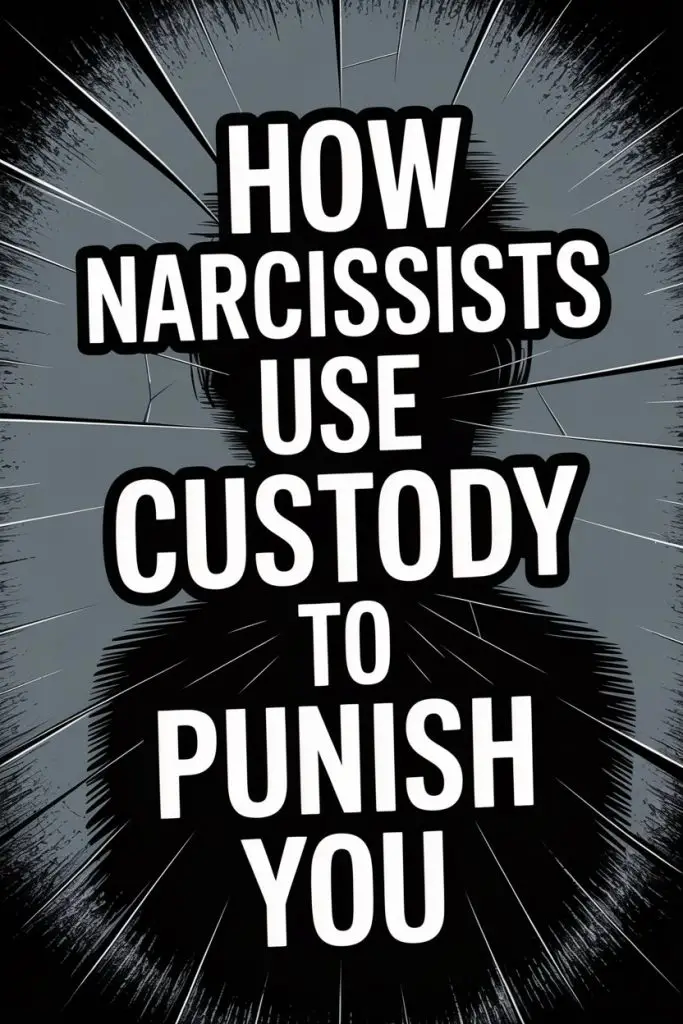Co-parenting with a narcissist is a bit like playing chess against an opponent who keeps moving your pieces when you’re not looking.
Custody battles, for them, are less about the kids and more about keeping you under their thumb. You’re not crazy—it really is as exhausting as it feels.
Let’s rip the curtain away and see just how narcissists weaponize custody, why it’s so maddeningly effective, and how you can protect both your sanity and your children.
Control Is the Name of the Game
If there’s one thing a narcissist loves more than their own reflection, it’s control. Custody arrangements become a shiny new toy—a way to dictate your choices, your time, and sometimes even your happiness.
They’ll insist on last-minute schedule changes, micromanage exchanges, and rearrange holidays like a toddler with a messy calendar. The aim isn’t compromise; it’s chaos.
If you feel like you’re constantly waiting for the next surprise, that’s the point.
Blame and Shame Olympics
Narcissists have gold medals in blame. In the custody arena, they swoop in with accusations about your parenting—real, imagined, or pulled from thin air.
Maybe you didn’t pack the “right” snack. Perhaps bedtime was five minutes late. Next stop, “unfit parent” station.
This isn’t about what’s best for the kids—it’s about making you feel small. Sometimes, they’ll even parade their antics in front of the children.
The goal: plant seeds of doubt and guilt, and make you question your every instinct.
Weaponizing the Legal System
The family court system wasn’t built for this kind of gamesmanship, but narcissists treat it like their personal theater. Endless motions, frivolous complaints, surprise court dates—just a regular Tuesday for them.
Dragging you back to court at the drop of a hat isn’t about justice; it’s about draining your time, money, and emotional reserves.
The process itself becomes the punishment—a war of attrition where your lawyer’s retainer melts away and your patience does a disappearing act.
Rewriting the Narrative
Narcissists are master storytellers. Watch how quickly they become the perfect parent in their own retelling: the selfless martyr, the victim of your “irrational” behavior.
They’ll paint you as unstable, controlling, or distant. Facts are optional; drama is non-negotiable.
This narrative isn’t just for the judge or your mutual friends—it’s also for your kids, who might start to wonder whose version of reality holds up.
Covert Undermining of Your Authority
Ever sent your child over to the other parent’s house only to have your rules gleefully ignored? Bedtimes? Irrelevant. Screen time? Unlimited. Respect? Who needs it.
Narcissists know that making you look like the strict or boring parent sets them up as the fun one. It’s not about bonding with the kids—it’s about keeping you off balance.
Bonus points if your child comes home parroting, “But Dad lets me!” or “Mum says you’re mean!”
Emotional Sabotage and Manipulation
Narcissists know exactly which buttons to push. Missed handoff? Must be your fault. A sick child on your weekend? Clearly, you’re neglectful.
Every minor hiccup is an opportunity to stir up guilt, anxiety, or self-doubt.
If they sense you’re moving on or recovering, expect a sudden uptick in custody drama. Emotional sabotage is their love language—except with even less Hallmark charm.
Involving the Kids in Adult Drama
Some parents shield their children from grown-up problems. A narcissist? Not so much. Kids become messengers, spies, or reluctant allies. “Tell your mom she’s late again,” or “Daddy says you’re lying.”
Dragging the children into the fray isn’t just unfair—it’s emotionally damaging. But for someone who views custody as a chess match, the kids are pawns.
If your child seems anxious, torn, or suddenly cagey, they’re probably feeling the squeeze too.
Using Custody to Monitor and Harass
Boundaries? Narcissists view those as optional. The more custody exchanges, the more chances to snoop, interrogate, or guilt-trip.
They’ll scrutinize who drops the kids off, who’s pictured in social media posts, even who’s in the background during a video call. Any information can be twisted into fresh drama.
Nothing says “moving on” quite like being grilled about your dinner guests by your ex.
Dragging Out the Process
Resolution is boring to a narcissist. Drawing things out keeps you tired, distracted, and less likely to fight back. Expect delays, ghosting, and sudden “emergencies” that throw plans into disarray.
Missed paperwork? Critical emails sent to the wrong address? No show at mediation? All part of the performance. If you feel like you’re running a marathon with no finish line, welcome to the club.
Manipulating Child Support and Finances
Money is power. Narcissists know this and will use child support as a bargaining chip—or a club. Delayed payments, sudden requests for extra expenses, accusations of “wasting” funds—nothing is off-limits.
If possible, they’ll try to bleed you dry with legal bills, financial threats, or by withholding child support to “punish” you for supposed slights. It’s less about providing for the kids and more about keeping you under financial stress.
Gaslighting and Reality Distortion
Gaslighting isn’t just a party trick—it’s a lifestyle. “I never said that.” “You agreed to the change.” “You’re imagining things.”
The goal is to make you question your memory, your judgment, and even your sanity.
If you find yourself double-checking emails or keeping meticulous notes, congratulations—you’re living in the Twilight Zone, courtesy of your narcissistic co-parent.
Triangulation and Division
If one-on-one antagonism starts to lose its shine, a narcissist will enlist others: new partners, grandparents, mutual friends. Suddenly, everyone has an opinion about your parenting.
This spreading of drama keeps you isolated and on the defensive. Bonus for them if they can convince others you’re the “problem parent”—extra points if your own kids start parroting those lines.
Refusing to Co-Parent
Co-parenting requires the tiniest speck of empathy and flexibility. A narcissist will dig their heels in and refuse to collaborate, even on the simplest decisions.
Joint birthday party? Not happening. Agreeing on medical care? Prepare for a tug-of-war. Every choice, large or small, becomes another battlefield.
The aim: wear you down until you stop fighting for what your kids need.
The Aftermath for Kids
Children may become anxious, withdrawn, or even act out, struggling to make sense of the drama. Loyalty conflicts can leave them feeling guilty for loving both parents.
School performance might dip. Friendships and hobbies take a backseat. The collateral damage is real, and it lingers.
If your child seems stuck in the crossfire, they need reassurance that none of this is their fault. Your consistency matters more than ever.
What Actually Works Against the Punishment Game
If all of this sounds bleak, take heart—there’s a toolkit for surviving these antics, and it doesn’t involve stooping to their level.
- Set your boundaries and stick to them. Communicate only as needed, and preferably in writing. If it’s not in a text or email, it didn’t happen.
- Document everything—dates, times, conversations, missed pickups. The more facts, the better.
- Don’t take the bait. Narcissists thrive on reaction. When they try to get a rise out of you, channel your inner poker face.
- Lean on your support system. Whether it’s friends, family, or a well-chosen therapist, you’re not meant to white-knuckle this solo.
- Shield your kids from adult drama as much as possible. Keep your explanations age-appropriate and avoid badmouthing the other parent, tempting as it may be.
- Legal backup is your friend. A good attorney isn’t just for court—they can help create parenting plans that minimize room for manipulation.
Hope and Healing Are Still on the Table
Narcissists may make co-parenting feel like a never-ending episode of a headache-inducing reality show, but they don’t get to write your story’s ending.
It’s possible to put boundaries in place, protect your kids, and reclaim your peace—even if the chaos never truly disappears.
Your resilience is bigger than their need for control. And your children? They’re learning what real love and steadiness look like, courtesy of the one parent who actually showed up.
That’s not just survival—that’s winning.


